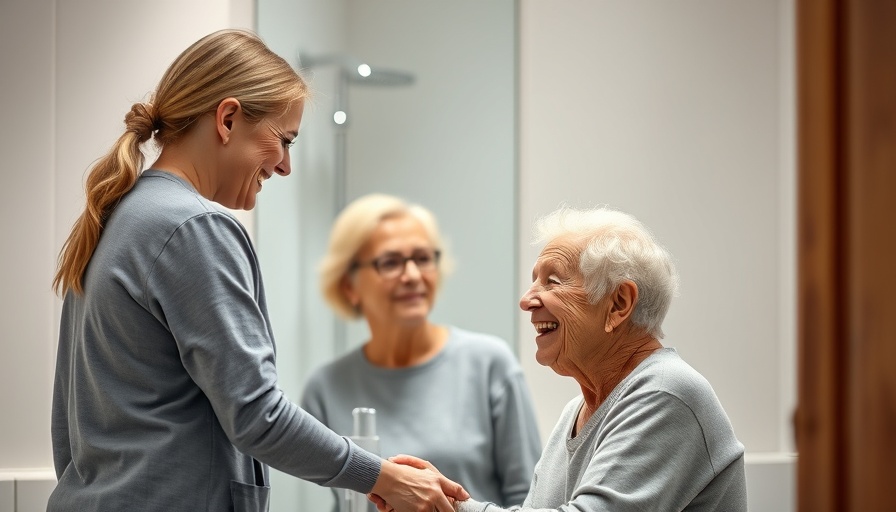
The Importance of Bath Time: More Than Just Hygiene
For elderly residents, particularly in Toms River, bath time is a vital ritual that transcends the mere act of washing. It plays a crucial role in maintaining not only personal hygiene but also overall health and emotional well-being. When caregivers recognize this importance, they can make bath time a moment of tranquillity and care rather than a source of stress.
Bathing helps prevent skin irritations and infections that often plague seniors due to decreased immunity. Furthermore, the experience can uplift mood and offer a sense of independence and dignity that many elderly individuals value deeply. It’s a pivotal time for connection, allowing caregivers and residents to bond over a shared understanding of needs and experiences. Therefore, it’s essential for caregivers to approach this regular practice with a sensitivity to the emotional and physical challenges seniors face.
Understanding Individual Needs: A Personalized Approach
Every elderly resident has unique needs related to their bathing experience. As caregivers in Toms River work to assist, acknowledging these personal requirements becomes fundamental. A thorough assessment of mobility, medical conditions, and comfort levels in different bathing settings is crucial.
Caregivers should engage in conversations with the elderly residents, allowing them to voice their preferences and fears surrounding bath time. Some residents may favor relaxing bubble baths while others may feel more secure with a quick shower. By respecting these choices, caregivers empower seniors, promoting a sense of autonomy in their self-care routines.
Creating a Safe Bathing Environment: Essential Modifications
Ensuring the safety of elderly residents during bath time cannot be emphasized enough. A modified environment can significantly reduce risks such as slips and falls that pose a considerable hazard to seniors. Essential modifications include the installation of grab bars near bathtubs and showers and the use of non-slip mats in wet areas.
Employing these safety enhancements not only protects elderly residents but also reassures caregivers and family members that their loved ones can navigate bath time with minimal risk. This proactive approach creates a welcoming and secure environment that fosters enjoyment and participation rather than fear and avoidance.
Empathy and Emotional Connection: Bridging the Gap
Bathing should not be a cold or clinical exercise. To enhance the overall experience, caregivers are encouraged to create a warm and inviting atmosphere. Utilizing gentle, relaxed tones and words of encouragement can significantly impact how elderly residents perceive bath time. Sounding upbeat and supportive helps alleviate apprehensions and encourages participation.
Incorporating sensory elements such as soft music, warm towels, or favorite bath products can transform the bathing experience into a cherished ritual rather than a mundane task. Understanding and catering to emotional needs are just as crucial as managing physical aspects.
Effective Communication: Keeping Elderly Residents Involved
Effective communication is key to successful bathing sessions. Caregivers should encourage elderly residents to express their thoughts and feelings about the bathing process openly. Creating a dialogue not only builds trust but also helps caregivers gain insights tailored to each resident's preferences and possible challenges.
Engaging in discussions about sensory preferences, such as water temperature and lighting, can positively influence how seniors experience bath time. Allowing them to make decisions regarding their bathing routine fosters a sense of ownership, thereby integrating autonomy into their daily lives.
Final Thoughts: Enhancing Quality of Life Through Care
In conclusion, when caregivers in Toms River approach bath time with an understanding of the emotional, physical, and safety concerns of elderly residents, they create an environment that promotes overall well-being. It’s more than just hygiene; it’s about enhancing quality of life and fulfilling emotional needs through compassionate care.
By implementing personalized strategies and fostering open communication, caregivers can turn bath time into a therapeutic experience for the elderly, enriching their lives while ensuring dignity and self-care are prioritized.
If you're looking for more information on how to navigate the complexities of caregiving, particularly in assisting seniors with bathing, check our resources on caregiver strategies and modifications.
 Add Row
Add Row  Add
Add 




 Add Row
Add Row  Add
Add 

Write A Comment